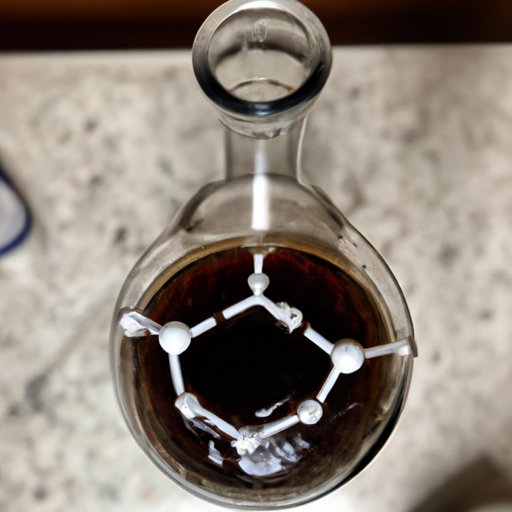Introduction
Coffee is one of the most popular beverages in the world, with over 2 billion cups consumed every day. But how does coffee work? To understand this, we need to take a closer look at the science behind it.

Exploring the Science Behind How Coffee Works
The chemistry of coffee is complex, but there are some key components that make it work. Let’s dive into these components and explore how they interact to produce the delicious beverage we know and love.
Chemistry of Coffee
Coffee is made up of hundreds of different compounds, including carbohydrates, proteins, oils, and alkaloids. The two most important components are caffeine and chlorogenic acid. Caffeine is a stimulant that gives coffee its energizing effects, while chlorogenic acid is an antioxidant that is believed to have health benefits.
Caffeine in Coffee
Caffeine is a naturally occurring chemical found in coffee beans, tea leaves, and other plants. It acts as a stimulant, helping to increase alertness, focus, and energy levels. The amount of caffeine in coffee varies widely, depending on the type of bean and brewing method. Generally, a cup of coffee contains about 95 mg of caffeine.

A Guide to Understanding the Chemistry of Coffee
To better understand how coffee works, let’s take a closer look at the structure of coffee molecules and how they interact with our bodies.
Structure of Coffee Molecules
Coffee molecules are made up of carbon, hydrogen, and oxygen atoms. The molecules are arranged in a ring-like structure, which allows them to easily dissolve in water. When coffee is brewed, the molecules break apart and release their flavor and aroma.
How Does Caffeine Interact with Our Bodies?
When we consume caffeine, it is absorbed into the bloodstream and travels to the brain. Once in the brain, it binds to adenosine receptors, blocking them and inhibiting their ability to transmit signals. This results in increased alertness, focus, and energy levels.
The Benefits and Risks of Caffeine in Coffee
Caffeine has many potential benefits, but it also carries some risks. Let’s take a look at the pros and cons of consuming caffeine in coffee.
Positive Effects of Caffeine
Caffeine has been shown to improve alertness, focus, and reaction time. It can also help reduce fatigue, enhance physical performance, and promote weight loss. Additionally, it may have beneficial effects on mood, memory, and cognitive function.
Potential Negative Effects of Caffeine
Although caffeine has many potential benefits, there are also some potential risks. Too much caffeine can cause restlessness, irritability, insomnia, and headaches. It can also lead to dehydration and increased heart rate and blood pressure. It is important to consume caffeine in moderation to avoid these negative effects.
How Does Coffee Affect Our Health?
In addition to the positive and negative effects of caffeine, coffee can also have both short-term and long-term effects on our health. Let’s take a look at how coffee can affect us.
Short-Term Effects of Coffee on Our Health
In the short term, coffee can have beneficial effects on our health. It can improve alertness, focus, and reaction time, as well as reduce fatigue. Additionally, it may have beneficial effects on mood, memory, and cognitive function.
Long-Term Effects of Coffee on Our Health
In the long term, the effects of coffee are less clear. Some studies suggest that it can reduce the risk of certain diseases, such as type 2 diabetes, Parkinson’s disease, and liver cancer. However, more research is needed to confirm these findings.

The Process of Brewing Coffee: An Overview
Brewing coffee is an art form, and there are many different methods to choose from. Let’s take a look at some of the most popular brewing methods and tips for making the perfect cup of coffee.
Different Types of Coffee Brewing Methods
There are several different methods for brewing coffee, including drip coffee, French press, pour-over, cold brew, and espresso. Each method produces a different flavor and strength, so experiment to find the one that works best for you.
Tips for Brewing the Perfect Cup of Coffee
No matter which method you choose, there are a few key tips for brewing the perfect cup of coffee. Start with fresh, high-quality coffee beans, grind them just before brewing, use filtered water, and adjust the grind size and extraction time to get the desired flavor.
Conclusion
Coffee is a complex beverage with many components working together to create its unique flavor and aroma. By exploring the chemistry of coffee and understanding how caffeine interacts with our bodies, we can appreciate how coffee works and the potential benefits and risks of consuming it. From selecting the right beans to experimenting with different brewing methods, there are many ways to enjoy a delicious cup of coffee.
Summary of Key Points
By taking a closer look at the science behind coffee, we can gain a better understanding of how it works. Coffee is made up of hundreds of compounds, with caffeine and chlorogenic acid being the two most important components. Caffeine acts as a stimulant, increasing alertness, focus, and energy levels. When consumed in moderation, coffee can have beneficial effects on our health. There are many different methods for brewing coffee, and the key to making the perfect cup is to use fresh, high-quality beans and adjust the grind size and extraction time.
Final Thoughts on How Coffee Works
Coffee is an incredibly complex beverage, and understanding how it works can help us appreciate its flavor and aroma even more. From exploring the chemistry of coffee to learning about the potential benefits and risks of consuming it, this article has provided an in-depth look at how coffee works.
(Note: Is this article not meeting your expectations? Do you have knowledge or insights to share? Unlock new opportunities and expand your reach by joining our authors team. Click Registration to join us and share your expertise with our readers.)
